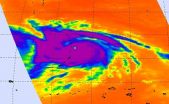INFORMATION:
For media enquiries contact Emily Head in the Cancer Research UK press office on 020 3469 6189 or, out of hours, on 07050 264 059.
Notes to editor:
* Paterson et al. Mobile element insertions are frequent in oesophageal adenocarcinomas and can mislead paired end sequencing analysis. BMC Genomics. DOI: 10.1186/s12864-015-1685-z. Research article will appear online at http://dx.doi.org/10.1186/s12864-015-1685-z
** Cancer Research UK's Catalyst Club is a pioneering venture to raise £10 million to propel forward the use of personalised medicine for people with cancer.
About Cancer Research UK
Cancer Research UK is the world's leading cancer charity dedicated to saving lives through research.
Cancer Research UK's pioneering work into the prevention, diagnosis and treatment of cancer has helped save millions of lives.
Cancer Research UK receives no government funding for its life-saving research. Every step it makes towards beating cancer relies on every pound donated.
Cancer Research UK has been at the heart of the progress that has already seen survival rates in the UK double in the last forty years.
Today, 2 in 4 people survive cancer. Cancer Research UK's ambition is to accelerate progress so that 3 in 4 people will survive cancer within the next 20 years.
Cancer Research UK supports research into all aspects of cancer through the work of over 4,000 scientists, doctors and nurses.
Together with its partners and supporters, Cancer Research UK's vision is to bring forward the day when all cancers are cured.
For further information about Cancer Research UK's work or to find out how to support the charity, please call 0300 123 1022 or visit http://www.cancerresearchuk.org. Follow us on Twitter and Facebook.
'Jumping genes' may drive esophageal cancer
2015-07-10
(Press-News.org) CANCER RESEARCH UK scientists have found that 'jumping genes' may add to the genetic chaos behind more than three-quarters of oesophageal cancer cases, according to research* published in BMC Genomics today (Friday).
The scientists, from the University of Cambridge, used cutting-edge technology that can read DNA to study the genes of 43 oesophageal tumour and blood samples to discover how much these mobile genetic sequences travel.
'Jumping genes', called L1 elements, can uproot themselves and move to new areas in the DNA, sometimes accidentally moving into genes that control the cell's growth.
They found evidence that this happened around 100 times in each tumour sample, and in some tumours it happened 700 times.
If a jumping gene lands in or near an important gene that controls cell growth, it can wreak havoc, changing how the gene works so that it inadvertently tells the cell to grow and divide out of control - which could lead to cancer.
Study author Dr Paul Edwards, at the Cancer Research UK Cambridge Institute, said: "These jumping genes play hopscotch across our genetic code in cancer cells more than in normal cells. When one of these mobile genetic sequences plants itself in the middle of a gene that controls the cell's growth it radically alters how the cell behaves, which can sometimes cause cancer.
"Research has shown that this might also happen in lung and bowel cancers. So it's vital we find out more about how the cells do this in a bid to find ways to treat these cancers."
The research is part of the International Cancer Genome Consortium (ICGC) - a global project using the latest gene sequencing technology to reveal the genetic changes behind cancer. The oesophageal cancer project is funded by Cancer Research UK's Catalyst Club**.
Dr Kat Arney, Cancer Research UK's science information manager, said: "Oesophageal cancer is one of the hardest cancers to treat, and we are committed to funding more research to find out its underlying causes. These new findings reveal more about the genetic chaos that underpins oesophageal tumours, and could one day help us develop better ways to diagnose, treat and monitor the disease."
ELSE PRESS RELEASES FROM THIS DATE:
Less intensive chemo avoids irreversible side effects in children's cancer
2015-07-10
CHILDREN with a rare type of cancer called Wilms' tumour who are at low risk of relapsing can now be given less intensive treatment, avoiding a type of chemotherapy that can cause irreversible heart problems in later life.
The move follows the results of a Cancer Research UK trial, published in the Lancet* today (Thursday), showing that the drug doxorubicin can be safely omitted from treatment without affecting patients' chances of survival.
Wilms' tumour is a type of kidney cancer that affects around 80 children a year in the UK, most under the age of seven. Until now, ...
Strong family bonds reduce anxiety in young people with lived experience of domestic violence
2015-07-10
Strong relationships with other family members can help raise self-esteem and reduce anxiety for some young people who grow up in homes affected by parental domestic violence.
This is the finding of a study by Doctoral student Catherine Naughton and colleagues from the University of Limerick that will be presented today, Friday 10 July 2015, at the British Psychological Society's Psychology of Women Section's annual conference being held in Windsor.
Catherine Naughton said: "Research has previously shown that strong social bonds can act as a beneficial psychological ...
Diet and exercise does not prevent gestational diabetes in obese women
2015-07-10
A diet and exercise regime for high-risk obese pregnant women, whilst effective in promoting a healthy lifestyle, does not prevent gestational diabetes, finds a study led by King's College London. The findings, published in the Lancet Diabetes and Endocrinology, suggest that programmes promoting healthy behaviours are unlikely to be effective in preventing diabetes in obese women; instead, resources should be directed towards better screening and treatment, including the use of a more stringent threshold for diagnosis.
Obesity rates are highest in developed countries, ...
ECG scans predict kidney disease patients' risk of dying from heart disease
2015-07-10
Highlight
Certain electrocardiogram measures helped investigators identify a subgroup of individuals with chronic kidney disease who had substantially elevated risks of dying from heart disease.
An estimated 26 million people in the United States have chronic kidney disease, and heart disease is the leading cause of death in these patients.
Washington, DC (July 9, 2015) -- Several common measures obtained from electrocardiograms (ECGs) may help clinicians determine a kidney disease patient's risk of dying from heart disease. The findings, which are published in a study ...
Uric acid may lessen women's disability after stroke
2015-07-09
DALLAS, July 9, 2015 -- Uric acid - a chemical at high levels can lead to serious illness - may lessen women's disability after stroke, according to new research in the American Heart Association's journal Stroke.
High levels of uric acid can lead to kidney stones or the inflammatory arthritic condition known as gout and is linked with heart and vascular problems and diabetes. However, in a new study, 42 percent of women treated with uric acid therapy following a stroke had little to no disability after 90 days compared to 29 percent of women treated with a placebo. Women ...
Evidence from past suggests climate trends could yield 20-foot sea-level rise
2015-07-09
When past temperatures were similar to or slightly higher than the present global average, sea levels rose at least 20 feet, suggesting a similar outcome could be in store if current climate trends continue.
Findings published in the journal Science showed that the seas rose in response to melting ice sheets in Greenland and Antarctica, said lead author Andrea Dutton, a University of Florida geochemist.
"This evidence leads us to conclude that the polar ice sheets are out of equilibrium with the present climate," she said.
Dutton and an international team of scientists ...
Nutrition researchers develop the healthy beverage index
2015-07-09
Philadelphia, PA, July 9, 2015 - Researchers at Virginia Tech have developed a new scoring method for assessing beverage intake, the Healthy Beverage Index (HBI). In a report published in the Journal of the Academy of Nutrition and Dietetics they describe how this tool can be used to more accurately evaluate dietary consumption of all types of fluids. They found that higher HBI scores were associated with more favorable lipid profiles, decreased risk of hypertension; and, among men, better C-reactive protein (CRP) levels.
Water consumption is associated with numerous ...
Everyday access to nature improves quality of life in older adults
2015-07-09
Natural environments are known to promote physical, mental, and spiritual healing. People can attain health benefits by spending time outside, often in remote places to "get away from it all." Now research conducted by a University of Minnesota graduate student with a team in Vancouver, B.C., shows that green and "blue" spaces (environments with running or still water) are especially beneficial for healthy aging in seniors.
Published in the journal Health and Place, the study -Therapeutic landscapes and wellbeing in later life: Impacts of blue and green spaces for older ...
Scientists study atmosphere of Venus through transit images
2015-07-09
Two of NASA's heliophysics missions can now claim planetary science on their list of scientific findings. A group of scientists used the Venus transit - a very rare event where a planet passes between Earth and the sun, appearing to us as a dark dot steadily making its way across the sun's bright face - to make measurements of how the Venusian atmosphere absorbs different kinds of light. This, in turn, gives scientists clues to exactly what elements are layered above Venus's surface. Gathering such information not only teaches us more about this planet so close to our own, ...
NASA's Aqua satellite observes Supertyphoon Nangka
2015-07-09
NASA's Aqua satellite passed over Supertyphoon Nangka on July 9 and provided a visible and an infrared view of the large storm.
At 0700 UTC (3 a.m. EDT) on July 9 a typhoon warning was in effect for Agrihan, Pagan and Alamagan in the northern Marianas. A tropical storm warning is in effect for Saipan and Tinian. Nangka passed over Alamagan.
The Atmospheric Infrared Sounder or AIRS instrument aboard NASA's Aqua satellite gathered infrared temperature data on Nangka on July 9 at 03:23 UTC (July 8 at 11:23 a.m. EDT). At the same time, the MODIS instrument took a visible ...

